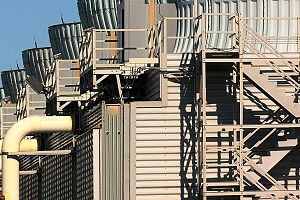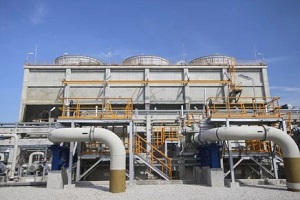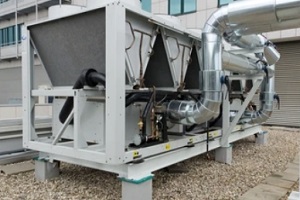 Preventing cooling tower overflow and water leaks is essential to conserve resources and ensure peak performance. These issues can compromise vital corrosion and scale protection, creating an environment conducive to the growth of harmful bacteria like Legionella. Furthermore, uncontrolled leaks can accelerate corrosion, leading to equipment deterioration and expensive repairs or replacements.
Preventing cooling tower overflow and water leaks is essential to conserve resources and ensure peak performance. These issues can compromise vital corrosion and scale protection, creating an environment conducive to the growth of harmful bacteria like Legionella. Furthermore, uncontrolled leaks can accelerate corrosion, leading to equipment deterioration and expensive repairs or replacements.
By actively addressing these issues, you can achieve improved energy and water efficiency, improve cost savings, and increase the life of your equipment.
Do I Have A Makeup Water Issue?
Are you concerned you have a potential makeup water issue affecting your cooling tower’s performance? Identifying and addressing makeup water problems is crucial for maintaining the efficiency and reliability of your HVAC system.
One telltale sign of a makeup water issue is an unusually high rate of water consumption in your cooling tower. If you find yourself constantly replenishing water at an alarming rate, it may indicate a problem with makeup water supply or excessive system losses.
Additionally, irregular water chemistry, such as elevated levels of dissolved solids or unbalanced pH, can be a red flag. Another sign to watch out for is rapid and unexplained scaling or corrosion within your cooling tower.
These issues can be linked to poor quality makeup water, which may contain excessive minerals, contaminants, or corrosive elements. Increased equipment maintenance and the presence of visible deposits are additional indications of a makeup water problem.
Loss Of Corrosion, Scaling, & Legionella Protection
By preventing cooling tower overflow and water leaks, you can effectively minimize the loss of chemicals used for corrosion, scale, and Legionella protection.
Overflow and leaks can lead to the dilution of water treatment chemicals and the depletion of inhibitors designed to control corrosion and scale formation. Moreover, stagnant water resulting from leaks provides an ideal breeding ground for Legionella bacteria to proliferate.
 Mitigating the loss of corrosion, scale, and Legionella protection requires proactive measures such as regular water treatment, monitoring water chemistry, and conducting routine maintenance and cleaning. By addressing cooling tower overflow and preventing water leaks, you can maintain the proper chemical balance, ensure optimal corrosion and scale control, and minimize the risk of Legionella growth.
Mitigating the loss of corrosion, scale, and Legionella protection requires proactive measures such as regular water treatment, monitoring water chemistry, and conducting routine maintenance and cleaning. By addressing cooling tower overflow and preventing water leaks, you can maintain the proper chemical balance, ensure optimal corrosion and scale control, and minimize the risk of Legionella growth.
Excessively Corroding Equipment & Longevity Of Systems
It is crucial to address and prevent cooling tower overflow and water leaks to mitigate the risk of excessively corroding equipment, which can significantly reduce the longevity of your cooling tower system. When cooling tower components are exposed to excess water or moisture due to overflow or leaks, corrosion becomes more likely and accelerates the deterioration process.
Excessive corrosion in cooling tower equipment weakens structural integrity, leading to premature failure and costly repairs or replacements. Corrosion can damage pipes, valves, heat exchangers, and other critical components, impairing their functionality and overall performance.
This not only affects the efficiency of the cooling tower system but also increases the risk of breakdowns and operational disruptions. Water leaks, caused by corroded equipment, contribute to the loss of water from the cooling tower system.
As water is lost, the system may struggle to maintain optimal operating conditions, leading to reduced cooling capacity, decreased heat transfer efficiency, and increased energy consumption. Additionally, water loss disrupts the balance of chemicals and inhibitors in the system, further exacerbating the corrosion problem.
Contact The Water Treatment Pros
To learn more about Tower Water's services reach out today!
Energy & Water Inefficiency
Cooling tower overflow results in the loss of water, which not only affects the balance and chemistry of the system but also increases the demand for makeup water. This, in turn, requires additional energy for water treatment, transportation, and reconditioning.
By stopping cooling tower overflow, you can minimize water wastage and reduce the energy required for water management processes.
Similarly, water leaks in the cooling tower system contribute to energy and water inefficiency. Leaks lead to a continuous loss of water, which means the system has to compensate by continuously supplying makeup water.
This constant water replenishment requires additional energy for pumping, treating, and maintaining the makeup water supply. By preventing water leaks, you can conserve water and reduce the energy consumed for makeup water operations.
Why You Need To Contact An HVAC Maintenance Company
 Professional HVAC maintenance services can help you manage and eliminate cooling tower overflow and water leaks. These experts will inspect your system, diagnose the issues, and implement appropriate solutions to avoid costly repairs or replacements in the future. Moreover, they can assist you in maintaining a proper balance of treatment chemicals, ensuring that your system is protected from corrosion, scale, and Legionella.
Professional HVAC maintenance services can help you manage and eliminate cooling tower overflow and water leaks. These experts will inspect your system, diagnose the issues, and implement appropriate solutions to avoid costly repairs or replacements in the future. Moreover, they can assist you in maintaining a proper balance of treatment chemicals, ensuring that your system is protected from corrosion, scale, and Legionella.
At Tower Water, we know that managing your building’s HVAC system can be challenging, particularly when dealing with ongoing issues like water loss or overflow. If you recognize these issues, a mechanical or HVAC contractor can help you, but it is important to maintain regular water treatment service to continue to monitor and protect your system. Our expertise in cooling tower water treatment can help mitigate the risks associated with corrosion, scale, and efficiencies.
Partnering with a reliable water treatment specialist who understands your facility’s unique requirements is essential for ensuring optimal water quality and system optimization. To learn more about our water treatment services or to schedule a consultation, contact Tower Water at 212-518-6475 or visit our website today.
